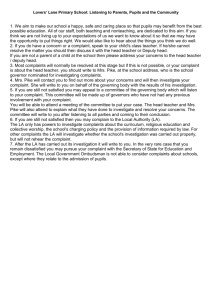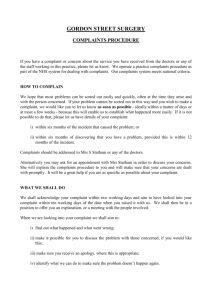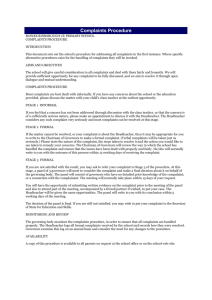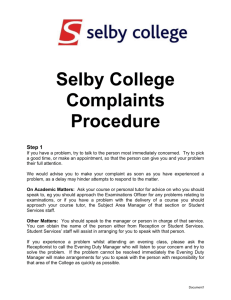policy for complaints about the schools*curriculum
advertisement
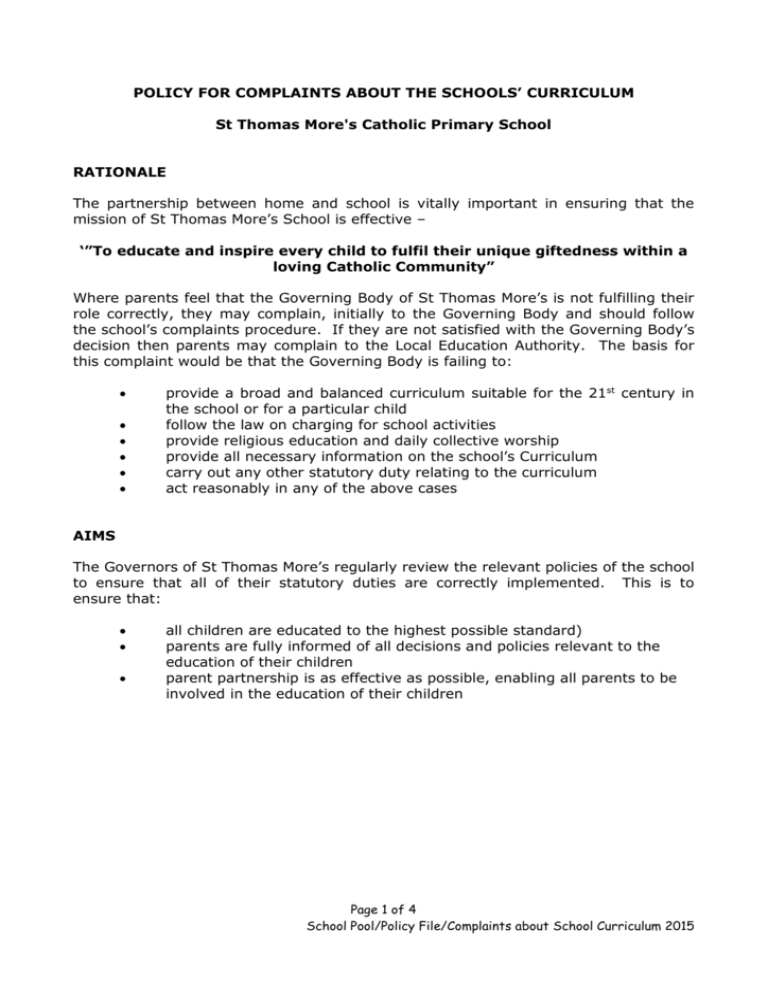
POLICY FOR COMPLAINTS ABOUT THE SCHOOLS’ CURRICULUM St Thomas More's Catholic Primary School RATIONALE The partnership between home and school is vitally important in ensuring that the mission of St Thomas More’s School is effective – ‘”To educate and inspire every child to fulfil their unique giftedness within a loving Catholic Community” Where parents feel that the Governing Body of St Thomas More’s is not fulfilling their role correctly, they may complain, initially to the Governing Body and should follow the school’s complaints procedure. If they are not satisfied with the Governing Body’s decision then parents may complain to the Local Education Authority. The basis for this complaint would be that the Governing Body is failing to: provide a broad and balanced curriculum suitable for the 21st century in the school or for a particular child follow the law on charging for school activities provide religious education and daily collective worship provide all necessary information on the school’s Curriculum carry out any other statutory duty relating to the curriculum act reasonably in any of the above cases AIMS The Governors of St Thomas More’s regularly review the relevant policies of the school to ensure that all of their statutory duties are correctly implemented. This is to ensure that: all children are educated to the highest possible standard) parents are fully informed of all decisions and policies relevant to the education of their children parent partnership is as effective as possible, enabling all parents to be involved in the education of their children Page 1 of 4 School Pool/Policy File/Complaints about School Curriculum 2015 MONITORING THE POLICY This Policy to be monitored by the Curriculum Committee through: regular Headteacher reports to the committee and made available to the full Governing Body receiving regular reports on updates to the school’s curriculum document and all relevant Policies – Teaching, Learning, Collective Worship etc and regular reports from lesson observations etc Reviewed by Staff – Approved by Curriculum Committee - Summer 2015 Review every three years – Summer 2018 Page 2 of 4 School Pool/Policy File/Complaints about School Curriculum 2015 GUIDELINES FOR POLICY FOR COMPLAINTS ABOUT THE SCHOOL’S CURRICULUM INFORMAL 1 It is natural that, initially, parents will want to discuss any concerns they may have, with their child’s class teacher. This usually enables problems to be sorted out quickly to everyone’s satisfaction. *Teachers have surgery times as listed in the school booklet when they can meet with parents or an earlier appointment may be made if the matter is more pressing. 2 Having gone through the above procedures, unresolved concerns should be brought to the attention of the Headteacher. 3 If the concern is not resolved at this stage, the complainant should then contact the Chair of the Governing Body. FORMAL 1 Formal Complaint to the Governing Body This is a statutory right for parents who still feel aggrieved after informal discussions. The Headteacher will let you have the name of the Assistant County Education Officer for the Division of which the school is part and give you a copy of the Procedure. The complaint will need to be in writing and may be submitted either to the Clerk to the Governing Body or to the Assistant County Education Officer. The complaint will then be investigated and urgent cases will be considered as a priority. A panel of Governors, usually three, will hear the complaint. They will not previously have been involved in any detailed discussion of your complaint. You will have the opportunity of calling any evidence in support of your case. You will be informed of the outcome of the complaint in writing. If your complaint is about religious or collective worship, the Governing Body panel will involve the Diocese in its arrangements. 2 Formal Complaint to Hampshire County Council or the Diocese This stage is available to you if you are not satisfied with the way the Governing Body has dealt with your complaint. You can also complain directly to the County Council when your complaint is against the Council rather than the school. Unless the complaint is about religious education or collective worship it will be to the County Council. The complaint should be set out in writing and sent to the County Education Officer who will arrange for the complaint to be investigated. Page 3 of 4 School Pool/Policy File/Complaints about School Curriculum 2015 Subsequently a panel consisting of the County Education Officer, two elected Members of Hampshire Education Committee, who do not have recent personal involvement with the school concerned, and a representative of the Diocese will consider the complaint. Again you will be able to present your case to the panel and will be notified of the outcome in writing. If your complaint is about religious education or collective worship, the appeal will be to the Catholic Bishop of Portsmouth and should be submitted through the Clerk to the Governing Body or the Headteacher. If your complaint is about religious education and you follow a particular religious tradition other than Catholic or Church of England, you are entitled to ask for a member of the Standing Advisory Council for Religious Education representing that tradition to be co-opted as an additional member of the panel. Your Headteacher can tell you which traditions are represented on that Standing Advisory Council. 3 The Role of the Secretary of State The Secretary of State may not consider any complaint within the scope of these arrangements until it has first been considered under the Hampshire Procedure. However, if you are still dissatisfied after the County Council has considered your complaint, you may then complain to the Secretary of State. Page 4 of 4 School Pool/Policy File/Complaints about School Curriculum 2015

